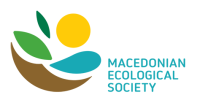Mitotic index and pollen viability of Helianthus annuus l., after treatment with Pb(NO3)2
DOI:
https://doi.org/10.59194/MJEE17191-2023dKeywords:
sunflower, lead, mitosis, mitotic index, pollen analysis, fertilityAbstract
Earlier research indicates that the presence of the lead in the soil demonstrates inhibitory influence on mitosis, meiosis, fertility and the complete growth and development of the plant. Thus this experiment aimed to investigate the influence of known concentrations of lead applied as Pb(NO3)2, on the mitotic cycle and fertility of the sunflower (Helianthus annuus L.). In the process, this cytotoxin was added in various proportionally increasing concentrations (40, 80, 160, 320 mg/kg) in two separate growth phases, in elongation phase and in flowering phase. It has been analysed what was the influence of various concentrations of lead over sunflower production of fertile and sterile pollen grains in correlation with the miotic index. Changes of the mitoitic index (MI) of the treated plants were detected, which was the main indicator for proliferation status of the cell population, and proportionally the increase of lead concentration in the soil resulted in decreasing of fertility and increasing of sterility. The obtained results on the influnce of lead on the cytogenic parameters, and the influence on development of this important agricultural crop, indicate the importance of undertaking activities, greater responsibilities and caution of mankind, being the main factor for waste water release and agricultural activities, i.e. inappropriate use of agricultural chemicals.
Downloads
Published
How to Cite
Issue
Section
License
Copyright (c) 2017 Gordana Dimeska, Gordana Bilbiloska

This work is licensed under a Creative Commons Attribution 4.0 International License.
Macedonian Journal of Ecology and Environment applies the Creative Commons Attribution 4.0 International ![]() license to articles and supplementary material we publish. If you submit your paper for publication to Macedonian Journal of Ecology and Environment, you agree to have the CC BY license applied to your work. Under this Open Access license, you as the author agree that anyone can reuse your article in whole or part for any purpose, for free, even for commercial purposes. Anyone may copy and redistribute the material in any medium or format as long as the author and original source are properly cited. This facilitates freedom in re-use and also ensures that Macedonian Journal of Ecology and Environment content can be mined without barriers for the needs of research.
license to articles and supplementary material we publish. If you submit your paper for publication to Macedonian Journal of Ecology and Environment, you agree to have the CC BY license applied to your work. Under this Open Access license, you as the author agree that anyone can reuse your article in whole or part for any purpose, for free, even for commercial purposes. Anyone may copy and redistribute the material in any medium or format as long as the author and original source are properly cited. This facilitates freedom in re-use and also ensures that Macedonian Journal of Ecology and Environment content can be mined without barriers for the needs of research.
Author - the holder of copyrights is encouraged to sign and return the Copyright form prior to the publication of the scientific article.
Licencing:

Macedonian Journal of Ecology and Environment is licensed under a Creative Commons Attribution 4.0 International License.

